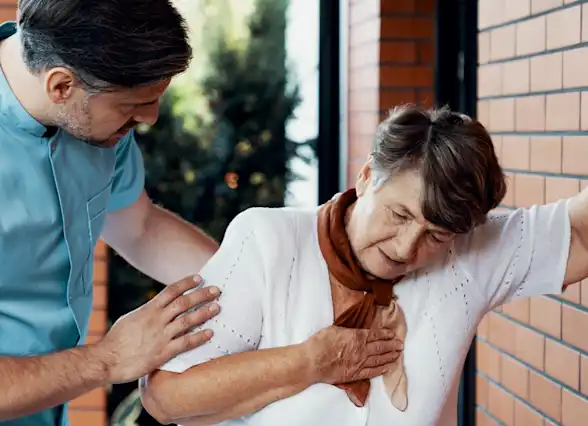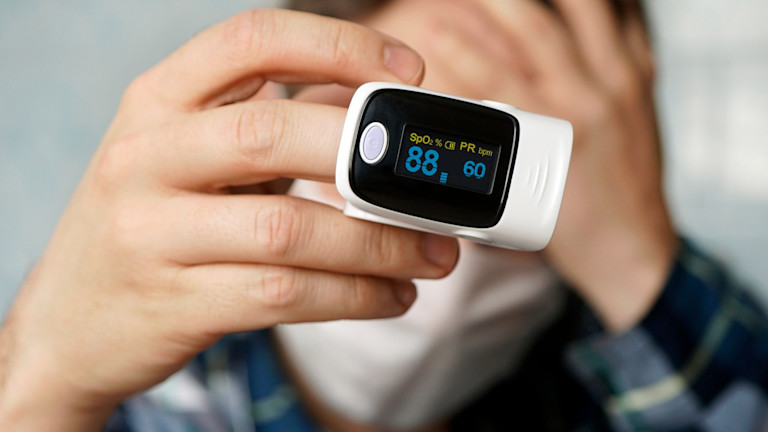Anticipate COPD Exacerbations (Flares)
Your loved one with COPD has suddenly worsening symptoms. You both may think it's just a bad day, but it could be COPD exacerbation (a.k.a. flare).
Get insurance benefits, legal documents, and medical records in one place

Helpful Highlights
COPD exacerbations (flares) are worsening symptoms of COPD that are uncomfortable and often disable your loved one.
Sometimes they can be managed at home and sometimes they require emergent attention from a provider. It's important to know the difference.
Understanding and following the care plan is essential for symptom management, which may prevent flares and keep your loved one out of the hospital.
The signs of a COPD exacerbation go beyond day-to-day COPD symptoms. The COPD symptoms become more severe and while everyone experiences exacerbations differently, there are definitive signs. Sometimes it’s easy to confuse them with other conditions like severe allergies, or a very bad respiratory infection. If your loved one with COPD is experiencing severe symptoms, regardless of the reason, seek to manage them and report them to the primary care provider or pulmonologist as soon as possible.
Signs of impending exacerbation
More coughing, wheezing, or shortness of breath than usual
Feeling unable to control breathing
Changes in the color, thickness, or amount of mucus (whether more or less)
Feeling drowsy, tired, or exhausted for more than one day
Onset or increased swelling of the ankles or lower legs
Increased difficulty sleeping
Feeling the need to increase oxygen, if on oxygen
Oxygen level lower than normal (as measured by a pulse oximeter)
Signs of active exacerbation and need for emergency care
Severe shortness of breath or chest pain
Numbness in the hands or feet
Bluish color in lips or fingers
Confusion, disorientation, or difficulty speaking
Significant drop in oxygen level (the provider will have given an acceptable range)

Exacerbations can last for days or even weeks and may require high-flow oxygen, medications like antibiotics and oral corticosteroids, and even hospitalization.
As lung function declines, exacerbations tend to increase in frequency and severity. Each time there is a COPD exacerbation, lung function may decline further.
What can you do for your loved one?
You can do a lot to help reduce the risk of exacerbations.
Help your loved one to stay on the prescribed COPD treatment plan.
Assist your loved one to avoid common triggers.
Smoking or being around others actively smoking
Indoor and outdoor air pollution - use an air ionizer, stay inside when outdoor air quality is low
Irritants such as aerosol sprays, as well as fumes from cooking or cleaning products
Keep indoor temperatures cool
Ensure everyone washes their hands frequently
Control household dust
Avoid anyone with active respiratory illness
Ensure your loved one has all the medications they need and knows how to take them as prescribed
Encourage early use of rescue medications (inhalers, nebulizers, anti-anxiety meds)
Encourage your loved one to get regular flu and pneumonia vaccines
Help your loved one to practice breathing exercises, relaxation, and body positioning techniques
Observe for subtle changes in demeanor or physical well-being and ask your loved one questions about what they're experiencing
Encourage your loved one to speak openly with you, their primary care provider, and their pulmonologist (if referred)
Coordinate and assist with follow-up appointments with providers and therapists
RESOURCES
American College of Chest Physicians (ACCP) – COPD
American Lung Association (ALA) – COPD
American Thoracic Society (ATS) – COPD
COPD.com – Understanding COPD Stages & Progression
Global Allergy & Airways Patient Platform (GAAPP) – Four Stages of COPD
National Institutes of Health (NIH) Heart, Lung & Blood Institute – Lung Health Resources
No content in this app, regardless of date, should ever be used as a substitute for direct medical advice from your doctor or other qualified clinician.
Get more support and guidance on insurance benefits, medical records and legal forms.
Helpful brings together your insurance benefits, legal documents, and medical records in one personalized place — so you always know what you have, and never have to search again.

Technology for Health Tasks. Mental Health for the Tough Stuff.
Helpful connects your medical records, insurance, and caregiving tasks automatically. And when you need more than logistics, a therapist is here to guide you.
In-Network and Covered
For Individuals, Couples and Families
HIPAA Compliant, Data Stays Private


Healthcare Tasks Simplified

From syncing records to spotting drug interactions, Helpful does the heavy lifting, turning complex health info into clear tasks and showing you benefits you can actually use, giving you clarity and control over your care.

In-Network Mental Health

Our licensed therapists are here to support you and your loved ones through stress, burnout, and life’s hardest moments, with an inclusive, compassionate approach that works with most insurance plans.

Create Legal Documents

Plan ahead by creating will, trusts, advance directives and more, that ensure your wishes are honored in the event you can’t speak for yourself -with Helpful guiding you every step of the way.